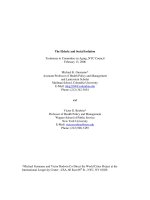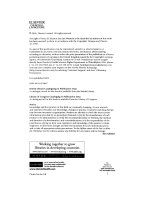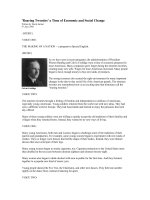ETHICS, PSYCHE AND SOCIAL RESPONSIBILITY pptx
Bạn đang xem bản rút gọn của tài liệu. Xem và tải ngay bản đầy đủ của tài liệu tại đây (521.13 KB, 173 trang )
ETHICS, PSYCHE AND SOCIAL RESPONSIBILITY
Corporate Social Responsibility Series
Series Editor:
Professor David Crowther, De Montfort University, UK
This series aims to provide high quality research books on all aspects of corporate
social responsibility including: business ethics, corporate governance and
accountability, globalization, civil protests, regulation, responsible marketing
and social reporting.
The series is interdisciplinary in scope and global in application and is an
essential forum for everyone with an interest in this area.
Also in the series
Higher Education and Civic Engagement: International Perspectives
Lorraine McIlrath and Iain Mac Labhrainn
ISBN 978-0-7546-4889-5
Managing Corporate Social Responsibility in Action: Talking, Doing
and Measuring
Frank den Hond, Frank G.A. de Bakker and Peter Neergaard
ISBN 978-0-7546-4721-8
The Employment Contract and the Changed World of Work
Stella Vettori
ISBN 978-0-7546-4754-6
The Cooperative Movement: Globalization from Below
Richard C. Williams
ISBN 978-0-7546-7038-4
Capitalist Networks and Social Power in Australia and New Zealand
Georgina Murray
ISBN 978-0-7546-4708-9
Stories, Visions and Values in Voluntary Organisations
Christina Schwabenland
ISBN 978-0-7546-4462-0
Whistleblowing and Organizational Social Responsibility: A Global Assessment
Wim Vandekerckhove
ISBN 978-0-7546-4750-8
Ethics, Psyche and
Social Responsibility
Edited by
ANA MARIA DÁVILA GÓMEZ
University of Quebec, Canada
and
DAVID CROWTHER
De Montfort University, UK
© Ana Maria Dávila Gómez and David Crowther 2007
All rights reserved. No part of this publication may be reproduced, stored in a retrieval system
or transmitted in any form or by any means, electronic, mechanical, photocopying, recording
or otherwise without the prior permission of the publisher.
Ana Maria Dávila Gómez and David Crowther have asserted their right under the Copyright,
Designs and Patents Act, 1988, to be identified as the editors of this work.
Published by
Ashgate Publishing Limited Ashgate Publishing Company
Gower House Suite 420
Croft Road 101 Cherry Street
Aldershot Burlington, VT 05401-4405
Hampshire GU11 3HR USA
England
Ashgate website:
British Library Cataloguing in Publication Data
Ethics, psyche and social responsiblility. - (Corporate
social responsibility series)
1. Social responsibility of business 2. Social pyschology
I. Dávila Gómez, Ana Maria II. Crowther, David
658.4'08
Library of Congress Cataloging-in-Publication Data
Ethics, psyche, and social responsibility / edited by Ana Maria Dávila Gómez and David
Crowther.
p. cm. (Corporate social responsibility series)
Includes index.
ISBN 978-0-7546-7089-6
1. Social responsibility of business. 2. Corporations Sociological aspects. 3. Industrial
relations. 4. Job stress. I. Dávila Gómez, Ana Maria. II. Crowther, David.
HD60.E845 2007
658.3'12 dc22
2007003832
ISBN 13: 978 0 7546 7089 6
Printed and bound in Great Britain by Antony Rowe Ltd, Chippenham, Wiltshire.
Contents
List of Figures and Tables vii
Notes on Contributors ix
Introduction 1
Ana Maria Dávila Gómez and David Crowther
1 Psychological Violence at Work: Where does the Human Dignity Lie? 15
Ana Maria Dávila Gómez and David Crowther
2 Organizational Change, Human Condition and the Moral Contract 35
Emmanuelle Avon
3 Preventing Alcohol Consumption During Pregnancy: Do Time
Orientation Perspective and Skepticism Matter? 59
Yaromir Munoz Molina
4 Reflection about the Structuration of Organizations: The Capacity of
Responsibility of Human Agents and Conditions of Absence 73
Jacques-Bernard Gauthier
5 Suffering as a Quest for Adaptation 93
Pierre-Paul Morin
6 Psychoanalysis and the Myths of Corporate Communication 107
David Crowther and Ana Maria Dávila Gómez
7 Caring Principle and Practices in Corporate Social Responsibility 129
Jelena Debeljak, Mirna Koričan, Kristijan Krkač
and Andrijana Mušura
8 Critical Pedagogy as a Strategy for Management Development:
Introducing Intersubjectivity as a Practical Application Tool 143
Ana Maria Dávila Gómez and Jair Nascimento Santos
Index 157
This page intentionally left blank
List of Figures and Tables
Figure 4.1 The stratification model of the action and the agent’s strata
of the psyche (Giddens, 1979, 1984) 77
Figure 4.2 The dimensions of duality of structure (Giddens 1984: 29) 79
Figure 6.1 The Saussurian Dyadic 109
Table 2.1 Science and engineer labour force 44
Table 2.2 Science and engineer labour force disparities between
large and
small cities 44
Table 2.3 Change leadership practices 45
Table 2.4 Situational leadership ethical behaviour 48
Table 2.5 Motivation factors 51
Table 4.1 Resources that constitute the structures of domination,
classified in allocative resources and authoritative resources
(Giddens 1984, p. 258) 80
Table 8.1 Hierarchical pedagogical approaches 145
Table 8.2 Benson’s theory components in praxis reflections 148
This page intentionally left blank
Notes on Contributors
Emmanuelle Avon Ph.D. is a professor at the Université du Québec en Outaouais
(UQO) in Administrative Sciences. She holds a Ph.D. from École des Hautes Études
Commerciales (HEC) in Montréal, Canada. She is also a member of the Research
Centre Humanism, Management and Globalization at École des Hautes Études
Commerciales (HEC) in Montréal, Canada. Her area of research is organizational
change, leadership and human aspects. She has been a Director in Organizational
Change and Corporate Strategy for Bell Canada and a Sociologist-Economist at
Statistics Canada. She has published in the Association of Administrative Sciences
of Canada (ASAC), at the Institut de socio-economie des enterprises et des
organisations (ISEOR) and at the International Journal of Management Concept and
Philosophy (IJMCP).
David Crowther is Professor of Corporate Social Responsibility, De Montfort
University, UK. His career also includes service as general manager, consultant and
accountant in a wide range of organisational settings. The author or editor of 18 books
and more than 200 papers, on various aspects of organisational behaviour, knowledge
management, environmentalism, corporate reporting and social accounting, he is
also founding member of Association for Integrity in Accounting. His research
interests cover a wide area but are primarily concerned with issues surrounding the
accountability of organisations to their wider stakeholder community. He is founding
editor of Social Responsibility Journal and also on the Editorial Boards of several
journals and has organised a number of conferences and symposia in a variety of
areas.
Ana Maria Dávila Gómez is a professor in the Department of Administrative
Sciences at the Université du Québec en Outaouais (UQO), Canada, where she
teaches Management and Organizational Change, conducts researches on the
managerial challenges towards more social responsible organizations. She holds a
Ph.D. from the École des hautes etudes commerciales de Montréal, and an MBA and
an Industrial Engineer degrees from the Universidad del Valle, Colombia. For seven
years, she worked at various private and public organizations in Colombia (e.g.
Emcali – governmental service; Unitel – telecommunications; Lloreda – processed
food manufacturing) supporting and implementing Information Technology (IT) and
Business Process Reengineering projects. Her recent doctoral research treated the
human implications of IT in management education.
Jelena Debeljak is a teaching assistant in Business Ethics and Corporate Social
Responsibility, and Introduction to Philosophy Courses at Zagreb School of
Economics and Management, Croatia. Having graduated from the university in year
2006 in philosophy and religion sciences, she is preparing for a masters degree in
Ethics, Psyche and Social Responsibility
x
business. Since 2003 she has been working actively in the Business Ethics Centre of
the Faculty of Philosophy of the Society of Jesus in Zagreb. Her interests relate to
broad area of (human) relations phenomenon, manifested in public and private life,
specifically, business in encounter with multiculturalism and managing process’ of
positive change.
Jacques-Bernard Gauthier, Ph.D., is a professor in the Department of
Administrative Sciences at the Université du Québec en Outaouais (UQO),
Canada, as well as associate professor in the Faculty of Social Sciences at the
Université Laval, Québec, Canada. While studying his doctorate in Management,
he discovered a truly passion for theoretical and methodological concerns regarding
Organizational Studies, passion that he continues to develop nowadays throughout
his teachings and actual researches. As the holder of the courses of Epistemology
of Management, Organization Theory and Research Methodology, his research
works, academic papers and actual projects are concerned for the application,
many times upon a critical and reflective view, of the Structuralism Theory towards
organizations.
Mirna Koričan is Assistant Professor on courses in Management, Human Resources
Management, Strategic Management and Social Psychology at Zagreb School of
Economics and Management in Zagreb, Croatia. She holds a BA in Psychology and
is in the last stage of her MA program in Management and Organization. She is a
project manager and a researcher in the field of Corporate Governance and Corporate
Social Responsibility and author of several articles in the field of management and
psychology.
Kristijan Krkač is Professor of Business Ethics and CSR, Zagreb School of
Economics and Management, and of Analytical Philosophy, Jesuit College in Zagreb,
Croatia. He is author of 3 books and more then 50 papers on topic of Wittgenstein
and European pragmatism in fields of religion, epistemology, ontology, and ethics.
In CSR he is co-editor of “Business Ethics and Corporate Social Responsibility”
(2006), and editor of textbook on BE and CSR (in Croatian). His interests cover
topics from Wittgenstein, pragmatism, normative ethics, business ethics, and CSR.
In last few years his interest covers influence of local European cultures on business
vice versa, especially vis-à-vis principal relation of these phenomena, and also
regarding particular cultural and business activities as it were particular business
practices. He has co-organized philosophical symposia and symposia and scientific
colloquia on CSR, and he is administrator of the journal “Disputatio Philosophica”.
Pierre-Paul Morin is a Civil Engineer and holds an MBA from the University of
Miami as well as a Doctoral Degree in Project Management from the Université
d’Aix-Marseille. A full-time teacher at the Université du Québec en Outaouais for
the last five years, his research focuses on the management of technical processes
and projects. He had a 25 year career as a CEO of consulting firms and Hi-Tech
companies. His recent doctoral thesis was on human resource and change management
in projects.
Notes on Contributors
xi
Yaromir Munoz Molina is Associate Professor in the Department of Marketing at
EAFIT University in Medellin, Colombia, where he teaches Analysis of consumer
behaviour and Issues in social marketing, conducts researches on the consumer
behaviour and the social marketing in the private business organizations as well as in
the public sector. He is actually a Ph.D. candidate from the École des hautes etudes
commerciales de Montréal (HEC Montréal), and holds an MBA from Instituto de
Empresa in Madrid, Spain. He has published one book entitled “El mercadeo social
en Colombia” (Social marketing in Colombia) and more than ten articles related
with consumer behavior topic.
Andrijana Mušura is Assistant Professor at Zagreb School of Economics and
Management in Zagreb, Croatia, assisting in courses in Social Psychology,
Organizational Behaviour and Consumer Behaviour. She is a psychology PhD
student at University of Zagreb, Croatia. Her research interests include corporate
social responsibility and she is author of several articles in the field of CSR.
Jair Nascimento Santos is a professor in the University of Salvador (Unifacs) and
State University of Feira de Santana (UEFS), Brazil, where he teaches Organizational
Theory, Management, Human Resources Strategic Management and Organizational
Change, conducts researches on the human resources, networks, leadership, managerial
changes and local development towards more social responsible organizations. He
holds a Ph.D. from the Federal University of Minas Gerais (UFMG) and École des
hautes etudes commerciales de Montréal (HEC Montreal), an Administration Master
Science degree from Federal University of Bahia (UFBA), Brazil. He worked at
various private and public organizations in Brazil (e.g. supermarket, department
store, and engineering enterprise – governmental service of transit) supporting and
implementing Gestion Technology and Business Process Reengineering projects.
His recent doctoral research treated the leadership in the networks contexts
This page intentionally left blank
Introduction
Ana Maria Dávila Gómez and David Crowther
The last couple of decades have seen considerable change in the structure of
business organisations, caused largely by their desire to gain competitive advantage
and by their desire to make use of the technological infrastructure available. Often
this has been legitimated as a reaction to the increasingly deregulated free market
environment brought into being as a consequence of globalisation. Equally often it
has been legitimated as a reaction to the need to create value for shareholders. This
has been manifest in the explicit aims of organisations, in three main areas:
The desire to cut costs primarily through reductions in employee costs; this
has led to a reduction in the number of direct employees as organisations have
sought to downsize;
The desire to return to core competencies through the divestment of non-core
businesses and functions; access to essential but non-core functions is now
achieved mainly through outsourcing the functions from specialists in these
areas;
The desire to flatten the hierarchical structures of organisations through a
reversion to flatter structures; this has led to the shedding of large numbers of
middle managers whose jobs are no longer essential in the changed business
environment.
As a consequence of these drivers of business management, organisations are now
leaner and fitter but inherent in these changes are certain dangers as organisations
seek to capitalise on their restructuring and achieve continued competitive advantage
and growth in this new environment. These dangers can be summarised as follows:
The socio-demographic structures of organisations have changed through
the loss of mainly older employees, with consequent implications for career
structures and succession management;
Essential skills have been lost from within the organisation and now have to
be bought in as required;
Spare capacity (slack resources) have disappeared thus affecting the ability to
cope with crises and future expansion;
There is an implicit assumption that the technological changes which have
facilitated such restructuring will adequately compensate for staff changes
Employees remaining with the company have been affected by the
uncertainty regarding job security and future prospects, and this has affected
motivation;
•
•
•
•
•
•
•
•
Ethics, Psyche and Social Responsibility
2
Recruitment and training problems have become more significant in this new
environment, particularly when societal demographic changes are considered.
More recently it has started to be discussed and recognised that this focus of
organisations in cutting costs through labour force reductions, while providing
short term benefit, is not without its problems and that problems have potentially
been stored up for the future. Thus managers are starting to recognise that there
is a need for them to manage their way out of the current short term focus on
business activity and build for the future. What is less certain however is that
managers understand the implications of the actions of the last decades upon
their existing, and potential, workforce, and the importance of the psychological
contract between employer and employee and the way this has been changed by
this new environment. Equally there is considerable uncertainty concerning what
can be done to bring about changes to this contract and invest in the future of
organisations.
The Sins of Accounting
Much of the change has been expressed in terms of the creation of value for
shareholders. And this has been used as a legitimation for change which has ignored
many of the consequences which we wish to focus on in this book. This change
has of course been firmly located and justifed within the discourse of accounting.
1
The discourse of accounting can be interpreted as being concerned solely with
the operational performance of the organisation. Contrasting views of the role of
accounting in the production process might therefore be epitomised as either providing
a system of measurement to enable a reasonable market mediation in the resource
allocation problem or as providing a mechanism for the expropriation of surplus
value from the labour component of the transformational process. Both strands of
the discourse however tend to view that labour as a homogeneous entity and consider
the effect of organisational activity upon that entity. Labour is of course composed of
individual people; moreover these individual people have a lifetime of availability
for employment and different needs at different points during their life cycle. The
depersonalisation of people through the use of the term labour however provides a
mechanism for the treatment of labour as an entity without any recognition of these
personal needs – merely another raw material in the manufacturing process. Thus
it is possible to restrict the discourse to that of the organisation and its components
– labour capital etc. – and to theorise accordingly.
This therefore illustrates the sins which are legitimated through the use of
accounting:
1 One of the authors of this introduction is qualified as an accountant.
•
Introduction
3
Labour as a Variable Cost
The use of the term labour is a convenient euphemism which disguises the fact
that labour consists of people, while the treatment of people as a variable cost
effectively commodifies these people in the production process. In order to create
value in the transformational process of an organisation then commodities need to
be used efficiently, and this efficient use of such commodities is measured through
the accounting of the organisation. When this commodity consists of people
then this implies using them in such a way that the maximum surplus value can
be extracted from them. The way in which this can be achieved is through the
employment of young fit people who can work hard and then be replaced by more
young fit people. In this way surplus value can be transferred from the future of the
person and extracted in the present. Thus in a competitive environment the worker
blames his fellow workers rather than the accounting which has legitimated his
sacking. This blame is caused by the competitive environment which has caused
this striving for jobs to be important and was recognised by Marx (1866: 91) in
stating:
The discussion of the workmen is created and perpetuated by their unavoidable competition
amongst themselves.
Labour and Machinery are Interchangeable
As people have been constituted as a commodified variable cost then they become
merely a factor of production which can be exchanged for another factor of
production, as the costs determined through the use of accounting legitimate. Thus
it is reasonable, through an accounting analysis, to replace people with machinery if
more value (profit) can be extracted in doing so, and this has provided the imperative
for the industrial revolution which has continued up until the present. Accounting
is only concerned with the effect of the actions of an organisation upon itself and
so the effect of mechanisation upon people need not be taken into account. Thus if
mechanisation results in people becoming unemployed (or possibly unemployable)
then this is of no concern – except to the people themselves. Equally if jobs are
relocated and stress levels changed dramatically this is of no concern. The use of
accounting however still legitimates the ignoring of these effects by the organisation
and the replacement of people with equipment. The only change in the present is that
people tend to be replaced by technology rather than machinery but the effects upon
those individuals is still equally devastating.
Wealth Equates to Welfare
The quantitative nature of accounting tends to focus upon the economic foundations
of the discipline and thereby to reinforce the preconception that it is only those things
which can be measured in financial terms, and thereby expressed as accounting
information, which have value. Thus economic wealth is all that matters. Economic
rationality presupposes that organisations, and the people within those organisations,
Ethics, Psyche and Social Responsibility
4
behave in a rational manner in terms of maximising utility, and the underlying
assumption of such rationality is that the organisation is attempting to maximise
utility for its owners, or shareholders. Under economic rationality this utility is
presumed to be synonymous with wealth,
2
perhaps because such wealth can be
quantified in accounting terms and thereby become subject to mathematical analysis.
It is also assumed unquestioningly in the discourse of economic rationality that what
benefits the shareholders of a business will also benefit the other stakeholders to the
organisation as well as society at large. Thus the monistic viewpoint of economic
rationality is based upon a stance within the discourse of modernity and accepts the
philosophy of classical liberal economics. Indeed this view also accepts the tenets of
classical liberalism in general.
In the present some things are different. Thus part of the discourse of accounting
at the present is concerned with how and to what extent environmental accounting
should be adopted by organisations. There is great concern, at least in Western
countries, about the effects of pollution – certainly in the context of global warming.
It is one of the dominant issues of the present and the effects on the future in terms
of effects upon lifestyle is the subject of much consideration. The unquantifiable
aspects of welfare however are still not considered to be a legitimate concern of
accounting and are removed from the discourse, although emotional and spiritual
welfare are considered to be important – and a subject of many of the contributions
to this volume – and subject to degradation at the present time. Equally other types
of pollution, such as noise pollution are of increasing concern at the present time.
Enacting Performance and its Consequences
Delivery of an organisation’s strategic objectives can be achieved through the use
of a system of performance indicators (Meekings, Dransfield and Goddard 1994)
but such a system needs appropriate linkages between top level strategy and lower
level operationalisation. More significantly the culture of the organisation must be
transformed to meet the strategic objectives of the organisation. Indeed strategies at
different levels within the organisation need to be coherent (Nath and Sudharshan
1994) and need to be reflected in the culture of the organisation. Appropriate
indicators used appropriately can build this coherence and facilitate the necessary
cultural transformation while inappriopriate indicators can have a dysfunctional
consequence for operational performance.
These dynamics reflect the dominant managerial approach that answers to
the neoliberal (positivist) conception of organizations, in which, everything that
includes thinking, proposition, and conception, belongs to the higher levels of the
hierarchy, where employees with no authority are conceived only as executors. In
this way, labour workers, whose definition is presented in previous points, have no
right to think, or to feel discomfort or fatigue, given that they risk losing their jobs
or they fear being replaced by someone cheaper in salary that can perform at least
2 See Crowther (2002) for a more detailed critique of these assumptions and the
underlying philosophy of liberalism.
Introduction
5
as much as them. Thus the introduction of processes conceived in other parts of
the world and performed by other cultures – a feature of globalisation – produces
not only misunderstanding but also stress in employees. For instance, regarding
back office services, a common operation which is realocated in the drive to create
shareholder value, we know that many times people operating in other countries
follow predetermined orders, procedures, and ways of acting. These are the excess
of rationalisation seeking performance growth, which is enhanced with the help of
many strategic and managerial models such as process reengineering. The effects of
this kind of managerial decision making is one the things discussed in this volume.
This introduction of ways of doing, often strange for local people, requires then an
accommodation and an organizational change, which most of the time is conducted
by some senior manager that belongs to the foreign country, in order to preserve the
mission and culture of the organization’s headquarters.
3
Simultaneously, in the few
cases where the manager is someone from the country where the back office operates,
the way of managing is also something ruled by the foreign country perception; it is
a situation that is also accepted by managers because they want to perform, and the
western way of operating business is the dominant thought paradigm worldwide.
In this process, the natural stress of employees is most of the times neglected by
the theory of organizational change, as discussed by Bareil and Savoie (1999) who
explain how a process of change inflects affective and cognitive anguish in people;
however those realities are not yet widely accepted nor considered. Hence, change
resistance, or stress, are seen as an impediment for the new way of operating, as
a source of conflict, moreover, as something that has to be anticipated in order to
elude its occurrence. However, employees at any level, as human beings, will always
have interests, interpretations and expectancies, that are not necessarily the same
for everyone (see Enriquez 1997). Therefore, conflicts or differences in points of
view are a natural state of our integrity. Thus, when dominant organizational theory
neglects the reality of our individual and social beings, a false and an incomplete set
of managerial tools for strategic success is developed.
For instance, the mere fact of imposing a foreign procedure as an “adoption
activity” that must be performed with no questioning by those who will execute it
later, implies the neglecting of an “adaptation process” to a different cultural context.
Here, managers operate organizational change with no consultation to foreign values,
culture or beliefs. They only drive their performance seeking actions answering
corporate rules, procedures, and therefore, pre-established indicators (either
quantitative or qualitative). Hereby, in organizational change theory, a supposition
is made about the participation of personnel, upon which, in order to eliminate
change resistance, there is a need to inform the personnel about what is going to be
introduced, and to allow a communication channel while the process is conducted
in case problems arise. Our practical experiences tell us that even though the latter
includes personnel, it does not integrate the complete interaction between persons,
because, the fact of giving information does not necessarily allow the receptor of
3 In fact, in international organizations, the manager level in the foreign country is
filled with people belonging to the owners’ country in order to assure control, loyalty and a
sense of organizational identification.
Ethics, Psyche and Social Responsibility
6
the information the right to answer nor to give opinions. In communication, there
is a difference between information, consultation, and dialogue. Furthermore, the
information activity (wrongly called communication process) is operated by managers
without consultation of propositions, because changes are already conceived. Here,
the change or activities to be modified are never consulted with the final executors.
Our research (see for example Crowther and Dávila Gómez 2006) also suggests that
in this sense, stress is reinforced when an employee dares to give an opinion that is
contrary to the imposed rules, because it represents the possibility of being fired or
psychologically mistreated. Hence, punishment for misbehaving become examples
to reinforce the silent role that employees are called to play.
Thus, upon the positivist philosophy of organizational theory, strategic and
managerial methods of transformation and change, treat the cultural component as
something that can be predicated upon few rules, therefore anticipated, and well
managed. Following these precepts, the works of Hoftstede (1980) and Hampden-
Turner and Trompenaars (2004) count among the most used approaches to deal
with cultural differences. Summarizing, these approaches presuppose four cultural
variables (individualism/collectivism; gender; hierarchical distance recognition and
control of the uncertain) that will allow any manager to perform well. However,
our practical experiences tell us that even though the definition of these variables
may identify some global characteristics of some societies, they do not identify the
particular cultural environment of any organization, nor the different and mixed
cultural values among personnel in various hierarchical levels; they are more
likely tied with anthropological community trails rather than with entire countries´
precognized stereotypes. As expressed by Berne (1996: 1036):
From diversity to humanism. Diversity programs can have significant inherent problems.
They can encourage resentment in majority employees. They can also give rise to
feelings of mistrust and agitation in minority employees who then question the motives
and sincerity of management’s push to diversify. […] What values are reflected in the
objectives of managing diversity? […] Typical managing diversity programs have arisen
from an attempt to “right the wrongs”, in an obligation to rectify injustices (races, gender).
[…] When diversity management programs are administrated without a moral dimension,
there may be the appearance of success as judged by raw numbers, but underneath will be
anger, hostility and frustration […] Diversity consciousness cannot simply be mandate into
a system, be trained into a corporate culture, or motivated by economic and promotional
incentives. It is reflective of an attitude which will appear when organizations, and the
people who comprise them, change their basic, fundamental concepts about who we are
as workers and why we work as we do […] The success of managing diversity will come
from a collective perceptual shift which by its nature converts notions of them into the
notion of us.
The previous shows us that in the current globalized economic world, more than
talking about national cultures, there is a mix of values, a transcultural composition
of groups, of individuals, where quantifiable precodification of variables will not
solve the problems of adoption or adaptation. There is the sharing and it enriches
values for all of us. Therefore, when managers try to apply the previous cited cultural
approaches to deal with cultural issues, they encounter many obstacles and realities
that have no explanation, in consequence, no way to deal with, no possible exit, no
Introduction
7
solution. At this point, the weak trial for cultural consideration is no longuer possible
and imposition of foreign values and change procedures regain their status.
On the contrary, a few managers, and in parallel, few organizational theory
and change procedures, follow a complementary approach of interpretative and
culture co-construction. Hereby, we talk about, for example, the works of d‘Iribarne
(1989),
4
who insists on taking a deterministic framework of cultural classification,
and insists on the need to interpret the organizational culture as a result of society’s
representations and symbolism, as well as the pluralistic mix of values of different
people within the organization. At the same time, we identify then that (as considered
by Zghal 2003), the organizational culture is the result of many complex subcultures
operating simultaneously. Our demand is then the need for those who own power
(shareholders and managers), who hold the imposed cultural values, to open a
communication dialogue process where other real and factual cultures may speak
out. As presented by Swanson (1975: 441–443 in Sills, ed.)
[…] symbolic interaction refers to the process by which individuals relate to their own
minds or the minds of others; the process, that is, in which individuals take account of
their own or their fellows’ motives, needs, desires, means and ends, knowledge, and the
like […] among sociologists it is often called social interaction […] When individuals
take account of the one another’s minds, they observe, and adapt to, the existence of these
instrumental process as such.
This dialogue will then allow the unveiling of others’ values, anguishes, expectancies,
and stress. Only in that way, the recognition of reality is possible in order to jointly
(by the different groups of stakeholders) propose solutions and procedural changes.
In doing so, we do not only allow cultural expressions as the voice of groups, but also
individuals’ meanings and symbolic representations of reality (ontological senses).
That means then the possibility to “adapt” and to “rearrange” with concerning for
those who will execute, and for those who will be served (customers).This is an
open process of interaction; where managers should develop attitudes of listening,
coherence and concern. Hereby, an interpersonal approach is therefore needed in
order to comprehend other ways of conceiving activities, meanings of action, and
as a result, mutual understanding and solution propositions. A path to start thinking
about ‘us’, not only ‘otherness’ but mostly about ‘wholeness’.
The Current Contribution
We have been researching and writing in this area for some time and the focus of our
attention has been on the effects of these changes upon individual people – not just
in their working lives but also in their social and family lives – and the effects upon
the people, particularly family, that they interact with. We have found ourselves
making extensive use of psychological theory in developing our understanding,
and particularly psychoanalytic theory as a helpful mechanism for explanation –
4 See also approaches of this kind in Alvesson (2002), who follows a more
hermeneutical and deconstructive methodology.
Ethics, Psyche and Social Responsibility
8
although we are fully aware that many people would dispute any claim to it being a
theory at all. Nevertheless we have found it helpful and it has been a major part of
the initial conceptualisation of this book. Our work has brought us into contact with
like minded people and this book is the outcome.
The contributions in this book are diverse in their topics, and this selection is
deliberate. So too is the selection of contributions from authors with a wide range
of backgrounds – both geographical and disciplinary. While these chapters may
initially appear to be diverse and unconnected, they are in fact linked by a common
theme in that they are all concerned with the usually neglected margins of corporate
activity and the various approaches to social responsibility. In other words the focus
of the various contributions is firmly upon the effects on people – employees and
their relatives – of the various aspects of corporate activity. We aregue that this is
a rich field for research which has been ignored to a large extent. This book is an
attempt to redress this absence.
In the first chapter Ana Maria Dávila Gómez and David Crowther start from the
position that the drive for shareholder value which has been a feature of business
over the past two decades has had many effects on business organisation and
many consequences not just for organisational behaviour but also for the people
who work within those organisations. So while much of the shareholder value
which has been created has been a cynical exploitation of power in adjusting the
distributional benefits of organisational activity and appropriating an increased
share at the expense of other stakeholders, there have been many other effects as
the psychological contract between employer and employee has been redrawn.
Thus alongside a reduced share of the value created in the transformational process
employees have lost any expectation of permanence of employment. Concurrently
people have become units of production rather than individuals as the newly created
human resources function has replaced the personnel department and techniques
such as knowledge management have been introduced to deskill people and make
them perfectly replaceable, one by another.
So while it is generally accepted that organisations have always been normalising
machines in which the individual is subjugated to the requirements of organisation
the uncertainties caused by the changes in business organisation have exacerbated
this effect. Certainty has been to a large extent replaced by uncertainty and this has
introduced an element of fear into the workplace. Fear of course is viewed as a
motivational factor because of its effect in shaping and controlling behaviour towards
the desired organisational goals; which means of course that more surplus value can
be extracted. At the same time however the soul of the organisation is jeopardised as
people’s behaviour changes in response to the organisational pressures. Consequently
risk minimisation governs people’s behaviour not just as far as organisational
behaviour is concerned but also at a personal level. In other words, as human beings
we are afraid to express our most profound feelings (those ontological) because that
could represent risk for our work assurance. It is argued that this is not just detrimental
for the goals of the organisation but also for the psychological and emotional welfare
of the people concerned. The purpose of this chapter is to explore and analyse the
effects of this facet of organisational life, from the perspective of individuals within
organisations and to speculate upon a prognosis.
Introduction
9
In the second chapter Emmanuelle Avon argues that a new phenomenon emerged
in Canada and has affected every sphere of the Canadian economic sectors and human
aspects of society. Strategic organizational transformations have been undertaken
to unprecedented levels, scope, scale and depths. The only way this paradigm
shift has been possible is by breaking the tacit moral contract that underlined this
economic and social effort. Leadership practices have been standardized in respect
with the teleological management practices. The social interaction contracts and the
determinist community social bonding determine this tendency to create a disruption
in the basic trust toward the leadership practices. The consequences are already
alarming for the human and economic costs. This chapter presents a structured
argumentation based on the most up to date empirical data to present organizational
change as a new capitalist phenomenon, the human conditions it has created and the
break of tacit moral contract.
In the third chapter Yaromir Munoz Molina returns to one of the themes addressed
by Dávila Gómez and Crowther, namely the effect upon family members arising
from the stresses of corporate life. In this chapter the focus is upon the use of alcohol
and its deleterious effects. Drinking during pregnancy remains as a great health
public problem, which is explored in detail in this chapter by Molina. Each year,
only in United States, more than 40,000 babies are born with some degree of alcohol
related problems and the life health care for each one in 2000 reached at $588.000.
Although the beverage-warning label is on the containers since 1989, at least 3.3%
of pregnant women interviewed in 1999 reported frequent drinking (Hankin, 2002).
However, the data gathered does not reflect the true reality because, according to
Hankin et al (2000), there were at least three limitations; first, data were self-reported
and might be subject to reporting biases. Second, homeless women or in homes
without telephones were not surveyed. Third, there were statistical limitations of the
sample because the proportion of the women who were drinking during pregnancy
was limited. These arguments allow suspect that the proportion of women who are
drinking during pregnancy is higher than is currently reported. The situation in low
development countries might be strongest because of alcohol consumption is high,
people are less educated, and data are not well known yet.
The main problem of drinking during pregnancy is the consequences on the
fetus. The most severe is Fetal Alcoholic Syndrome (FAS), which produces growth
retardation and developmental abnormalities in the central nervous system; the most
severe impact is mental retardation (Hankin, 2002). It is important to note that those
birth defects are preventable, and one way to prevent it named universal prevention
is putting beverage warning labels on the containers (Warren and Foudin, 2001;
Hankin, 2002). Since the law for warning started in 1989, many researches have
tried to establish effectiveness on prevention because it offers information about
risks related alcohol consumption (DeCarlo, 1997; Andrews, Netemeyer, Durvasula,
1990, 1993; Hilton, 1993; Hankin et al, 1993; Laughery, Young, and Vaubel, 1993;
Hankin, Sloan, and Sokol, 1998). This represents a critical social responsibility
issue for alcohol industries. It is imperative to address the question of conscious
and humanistic actions from inside marketing activities, moreover, while we know
that most organizations only take into account these issues when a governmental
prerogative is mandatory. It is also important to recognise the causes of such alcohol
Ethics, Psyche and Social Responsibility
10
use and the strains of corporate life are one important, and often neglected, reason
for this.
In Chapter 4 Jacques-Bernard Gauthier takes as his starting point the assertion
that organization theories are in continuous questioning. The bases of its questioning
are various. Among them, we find the debate between structure and action. Inside
social sciences, Giddens (1984) is one of the authors who studied the subject.
Essentially, he proposes an important reflection concerning the idea that structures
do not exist in an independent way form actions. Equally, for him, while individuals
are acting they are producing and reproducing the structures of the social systems.
He calls that principle the duality of the structure. Those interactions presented by
Giddens as one of the dimensions of the duality of the structure, unfold themselves
mainly as a co-presence. Giddens utilizes the notion of co-presence in the same
sense that Goffman (1959) does: “co-presence is anchored in the perceptual and
communicative modalities of the body” (Giddens, 1984, p. 67).
As Gauthier shows, the theory of structuralism does not deal directly with the
organization. However, it is seen by several authors as a conceptual architecture
that is very interesting as it studies daily interactions between individuals inside
organizations (Hatch, 1997). With the support of this point of view about the structure
of social systems, Giddens (1984) calls for a conscious awareness concerning the
relevance of the co-presence in organizations. In fact, the majority of interactions
with other individuals in organizations (whereas employees, clients, shareholders,
citizens, etc.) is developed in a context of co-presence. On the other hand, the theory
of structuration invites us to reflect about the absence as a modality of interactions
with other individuals (the alter-ego). Interactions with the alter-ego are more
particularly examined from the point of view of the capacity of responsibility, a
capacity of ethical nature of the human agents. These are the points that Gauthier
have been developed in this chapter.
Pierre-Paul Morin is concerned with suffering in the next chapter. As he
asserts, the word suffering is rarely found in business literature. It refers to a
strong emotion that also deals with personal and collective values. Suffering can
be useful when it is properly diagnosed and taken into account. It can be seen as a
symptom of something needing attention. It can be an opportunity to learn about
oneself or about group behaviours. It may be the catalyst to collective change. It
can even be essential to taking rational decisions. All suffering is not positive.
Some is pathological, either individually or even in a group. If it can sometimes
be an occasion to redefine and adjust values and beliefs, it can also come from
the expression of power and create a spiral of greater suffering. Suffering is part
of being human. When recognized, it is an opportunity for people to share their
humaneness. It opens the door to tolerance, courage, loyalty and friendship. It
sometimes creates freedom, justice and love.
As David Crowther and Ana Maria Dávila Gómez state, there are many
theories concerning the formation of personality and the way this formation
affects behaviour in organisations, one large body of thought is concerned with
psychoanalysis. Psychoanalysis is well known and it arouses strong feelings for
most people: some reject it absolutely while others think that it provides insights
which are not apparent elsewhere. Among academics some hold that it is coherent
Introduction
11
body of theory while others claim that it is not theory at all as the explanations
it gives are untestable. Here they do not enter this debate but rather look at
the perspective it offers upon behaviour in organisation, through a focus upon
corporate communications and the associated myths surrounding behaviour in
organisations. In this chapter they do this through the lens of semiology, focusing
upon an examination of corporate communication while considering this in the
context of some key psychoanalytic theorists, with particular emphasis being
placed upon the work of Jung and Lacan.
In Chapter 7 Jelena Debeljak, Mirna Koričan, Kristijan Krkač and Andrijana
Mušura are concerned with the ethics of care and with the role of women in society
in general and business in particular. They distinguish between female characteristics
and male characteristics and introduce the Ethics of Care as a different approach to
moral behaviour. They take a philosophical stance in their analysis of care which
is complemented by a righteous indignation that women are generally worse paid
than men and less likely to be promoted into the topmost echelons of the corporate
hierarchy. They also make a clear link between care, as an attribute, and corporate
social responsibility.
Dávila Gómez and Santos are concerned with the role of education in the
development of managers. As they state, as professional managers, we search to
contribute for change in society. On the other hand, we realize that there is a gap
in management training, because the trainees are stimulated to get success at any
cost. Beyond all traditional concepts that support unrealistic approaches, they try
to discuss the need to develop individuals with their minds open to plurality within
organizations. According to this, we try to figure out how to stimulate changes in
the attitudes of managers in order to get a real change in social reality. To find an
answer to that question, this article takes into account the philosophical support that
guides the education and the cycle of processes of education: planning, direction,
evaluation and controlling. Additionally, they have chosen a critical pedagogy
approach as strategy for management development, which emphasizes the process
of direction. In order to take into account the other three processes of the cycle, and
to make more practical this pedagogical approach, they introduce the concept of
intersubjectivity as a complementary tool that generates examples of reflections and
tasks for the students. They also show how that pedagogy is articulated and applied,
and they we make some comments concerning its implementation. Finally, they put
in question the limitation or possibility of applying the critical pedagogy, trying to
search for a hopeful and positive answer to that question.
As already stated, the diversity of contributions to this volume shows the broad
range of issues which need to be addressed in considering the effects of corporate
activity upon people – both employees and extending out from the working
environment to their families also. At the same time this diversity has a danger of
obscuring the commonality of the themes being addressed. This is a danger which
we accept in our desire to show the range of issues involved in, and range of people
concerned with this field. We hope that this book succeeds in opening up the discourse
in this neglected area.
Ethics, Psyche and Social Responsibility
12
References
Alvesson M. (2002), Understanding Organizational Culture; Sage: London.
Andrews, J. Craig, Richard G. Netemeyer, and Srinivas Durvasula (1990) “The Role
of Cognitive Responses as Mediators of Alcohol Warning Label Effect”, Journal
of Public Policy and Marketing, Vol. 12 (1), pp. 57–68.
Andrews, J. Craig, Richard G. Netemeyer, and Srinivas Durvasula, (1993), “Effects
of Consumption Frequency on Believability and Attitudes Toward Alcohol
Warning Labels”, The Journal of Consumer Affairs, Vol. 25 (2), pp. 323–37.
Bareil et Savoie (1999), Comprendre et mieux gérer le sindividus en situation de
changement organisationnel; Gestion Vol. 24 No. 3 automne pp. 86–94 HEC:
Montréal.
Berne R. (1996), Diversity; in Warner M. (eds) 1996 International Encyclopedia of
Business and Management. P Routledge: USA, Canada.
Crowther D. (2002), A Social Critique of Corporate Reporting; Ashgate: Aldershot.
Crowther D. and Dávila Gómez A-M. (2006), Stress in the back office; Proceedings
of India – The processing Office to the World; Kochi, January 2006; pp. 27–38.
DeCarlo, Tomas E. (1997), “Alcohol Warnings and Warning Labels: An Examination
of Alternative Alcohol Warning Message and Perceived Effectiveness”, The
Journal of Consumer Marketing, Vol. 14 (6), p. 448.
Enriquez E. 1997; Imaginaire social, refoulement et répression dans les organisations;
in Enriquez E. (1997), Les jeux du poivoir et du désir dans l’entreprise, pp. 75–
112; (ed.), Desclée de Brouwer: Paris.
Giddens , A. (1984), The Constitution of Society. Polity Press: Cambridge.
Goffman, E. (1963), Behavior in Public Places. Notes on the social organization of
gatherings. The Free Press: Cambridge.
Hampden-Turner and Trompenaars (2004), Au-délà du choc des cultures: dépasser
les opositions pour mieux travailler ensemble; trans. Larry Cohen, (ed.),
d’Organisation: Paris.
Hankin, Janet R., James J. Sloan, and Robert J. Sokol, (1998), “The Modest Impact
of the Alcohol Beverage Warning Label on Drinking During Pregnancy Among
a Sample of African and American Women,” Journal of Public Policy and
Marketing, Vol. 17 (1), pp. 61–70.
Hankin, Janet, Mary E. McCaul, and Janet Heussner, (2000), “Pregnant, Alchol-
Abusing Women”, Alcoholism: Clinical and Experimental Research, Vol. 24 (8),
pp. 1276–86.
Hankin, Janet R. (2002), “Fetal Alcohol Syndrome Prevention Research”, Alcohol
Research and Health World, Vol. 26 (1), pp. 58–65.
Hankin, J.R., I.J. Firestone, J.J. Sloan, J.W. Ager, A.C Goodman, R.J. Sokol, and S.S.
Martier, (1993), “The Impact of the Alcohol Warning Label on Drinking During
Pregnancy”, Journal of Public Policy and Marketing, Vol. 12 (1), pp. 10–18.
Hatch, M. J. (1997), Organization Theory. Modern, symbolic and postmodern
perspectives. Oxford University Press: Oxford.
Hilton, Michael (1993), “An Overview of Recent Findings on Alcoholic Beverage
Warning Label”, Journal of Public Policy and Marketing, Vol. 12 (1), pp. 1–9.
Hofstede G. (1980), Culture’s consequences: international differences in work-
related values; Sage: Berverly Hills, California.









